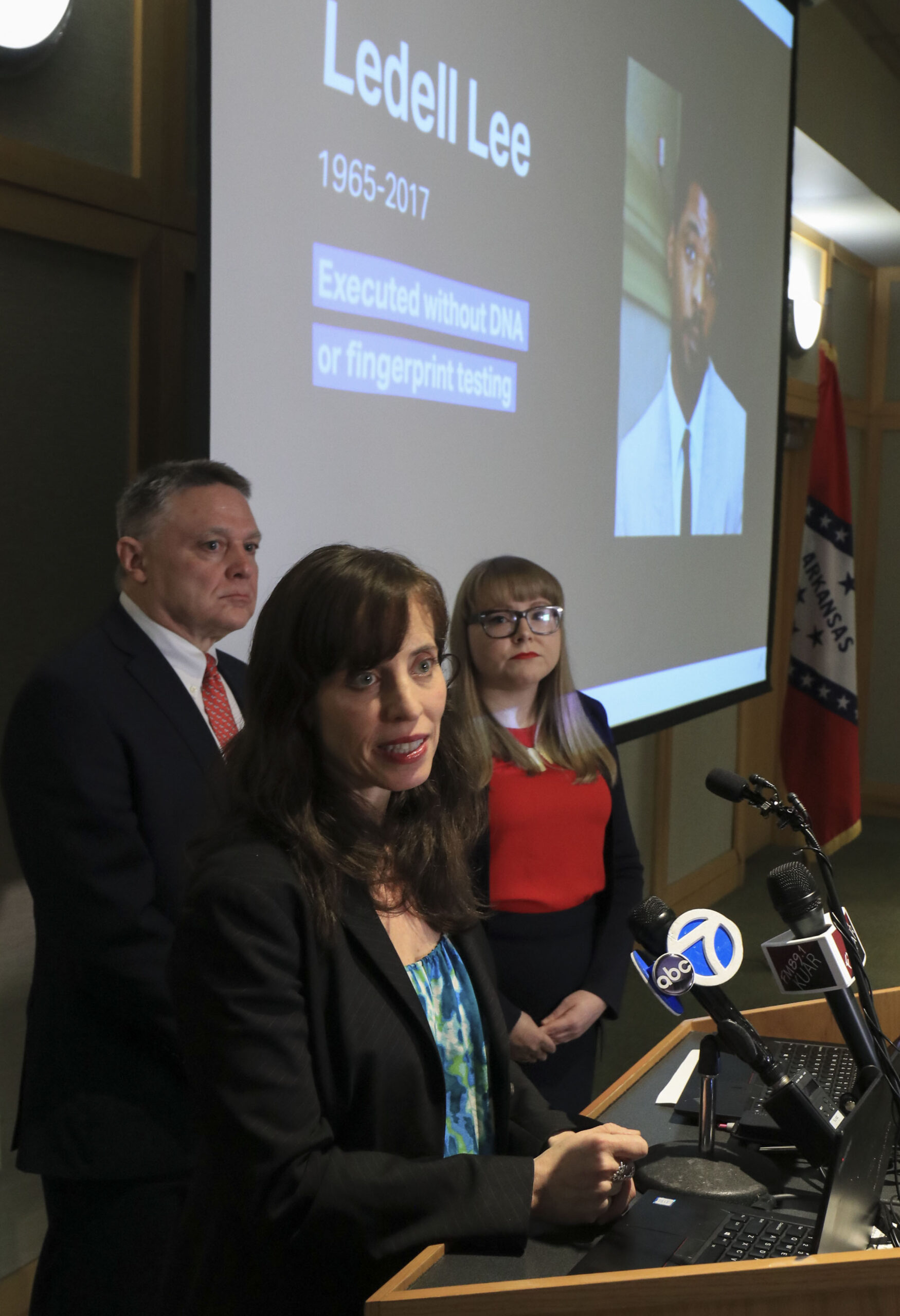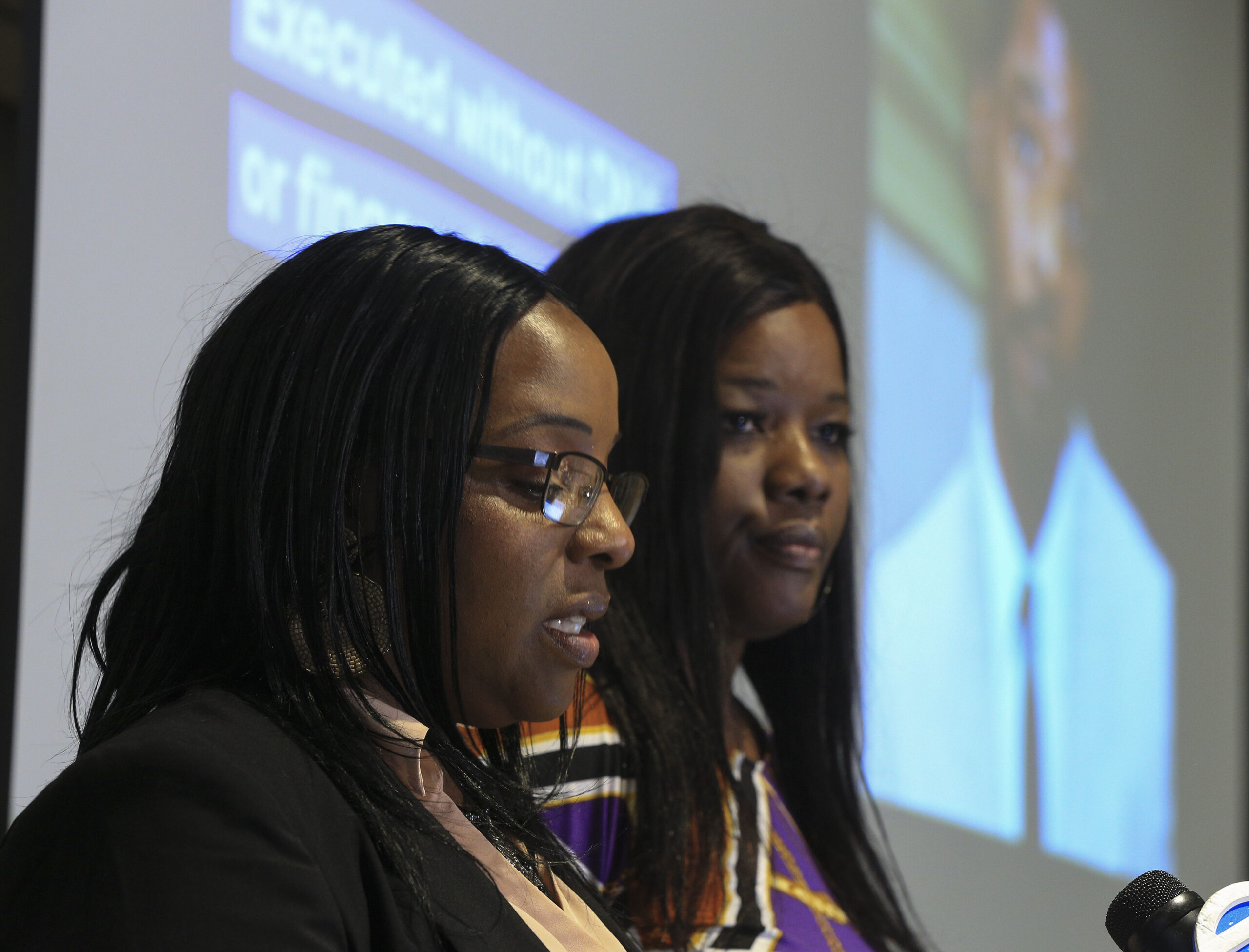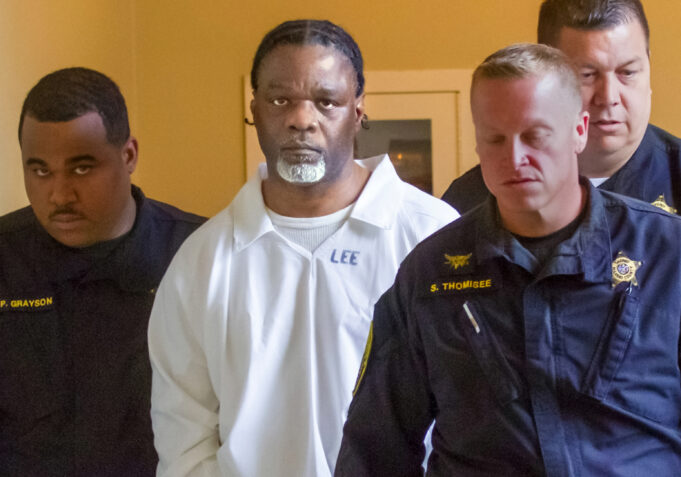Opponents of capital punishment have long argued that that the practice, while arbitrary and random, disproportionately affects Blacks, the poor and those unable to afford adequate legal counsel.
Most are greatly concerned that too many innocent people have been put to death by what they describe as a racist, classist, deeply flawed criminal justice apparatus. Those concerns are borne out by data culled by The Innocence Project which indicates that to date, 375 people in the United States have been exonerated by DNA testing, including 21 who served time on death row. These incarcerated individuals served an average of 14 years in prison before exoneration and release.
Then in early May, representatives of the Innocence Project and the American Civil Liberties Union released the results of new DNA analysis by top forensic experts producing what they say is “powerful new evidence supporting Ledell Lee’s longtime claim that he was innocent of a 1993 murder.”
This recent development is happening about four years after Mr. Lee was executed by lethal injection in Arkansas for the murder of 26-year-old Debra Reese, a White woman. Mr. Lee proclaimed his innocence for more than two decades, from the time he was accused and later charged until his death in 2017.
The judge in the trial and the district attorney refused to allow DNA tests before executing Mr. Lee. Now, these advocates say, the DNA evidence in the case points to someone other than Mr. Lee as having committed the murder.

“Since Ledell’s execution, we have discovered a wealth of new evidence supporting his claim of innocence,” said Nina Morrison, senior litigation counsel at the Innocence Project in a joint press release.“All of this evidence should have been presented to the courts while Ledell was still alive, but it wasn’t because he couldn’t afford a quality defense.
We know that 167 people have been exonerated from death row for crimes they did not commit, many after losing decades of their life behind bars. The lack of thoroughness in Ledell’s investigation helps explain how that happens, and we hope the Court will allow us to finally uncover the truth.”
The ACLU, the Innocence Project and a team of volunteer lawyers from Hogan Lovells have spent more than two years since Mr. Lee was executed investigating the forensic evidence and eyewitness testimony that was relied on by the state to convict and execute Mr. Lee. The results of this investigation include affidavits from some of the nation’s leading forensics experts, and provide strong reason to believe Mr. Lee may have been innocent, staffers said.
Representatives from The Innocence Project, the ACLU and Amnesty International USA declined to comment because the case is still open but according to media reports, attorneys for Mr. Lee’s family say a “wealth of new evidence supporting his claim of innocence” has been discovered since his execution, and they want to conduct testing on hairs from the bedroom, scrapings from Ms. Reese’s fingernails and on fingerprints from the scene.
They maintain that such evidence should have been presented in the courts while Mr. Lee appealed but that he “couldn’t afford a quality defense.”
Kami Chavis said she felt a heaviness when she heard about Mr. Lee’s possible innocence.
“In the judicial system, we see finality and closure but I’m seeing that we need to relax those windows,” said Ms. Chavis, professor of law and director of the Criminal Justice Program at Wake Forest University School of Law. “The harm of murdering a potentially innocent person outweighs any judicial efficiency. I think what these cases tell us is that if there’s one there are more.”

Prof. Chavis said each of these cases potentially calls into question the validity and integrity of the criminal justice system. We need to look at the policies and procedures, she argued.
“Sure, the other side will argue that they had other evidence but potentially executing innocent person is such a grave concern,” said Prof. Chavis, the vice provost who served as an assistant U.S. attorney in the District of Columbia for three years. “We should take every possible precaution … .”
The Rev. Graylan Ellis Hagler told The Final Call it’s clear by the way capital punishment is administered that too many innocent men and women are being executed by the state.
“Well, I must tell you that theologically, capital punishment is an apostrophe,” he said. “They’re trying to supplant God. God is the only one who can judge. Criminal justice tries to be judge and executioner, but God is the only entity which is infallible. Humans and institutions are fallible based on race, culture and the particular climate of the historical moment that we’re in.
“We have to understand that saying in a court of law that someone is guilty, and they’re later found innocent, in your mistake, you can’t undo it. This is judgement based on race and class which makes this ripe with possibilities of making a mistake. It’s fallibility versus infallibility. Only God can be the ultimate judge.”
The ACLU and Innocence Project had requested DNA tests before Mr. Lee’s execution, but things were allowed to go forward after Mr. Lee’s sister, Patricia Young, filed a lawsuit in 2020. Those results indicate that another man’s DNA was found on the murder weapon, a wooden club, and on a shirt that had been wrapped around the murder weapon. The unknown man’s DNA, however, was not found in the FBI’s national criminal database.
Five sets of fingerprints found at the scene of the crime that did not belong to Mr. Lee were also entered into a national database but also yielded no result. The Arkansas State Crime Laboratory has yet to test those fingerprints against its own database. Six hairs from the scene were also tested. Mr. Lee was excluded as the source of five but could not be excluded as the source of the sixth, though such “mitochondrial DNA profiles may be shared by thousands of individuals in a given population,” the Innocence Project said.
Retired Federal District Court Judge Kevin Sharp said he’s very frustrated with, and vocal about the mélange of problems and issues in the criminal justice system, saying that he grumbles a lot when contemplating the various problems and flaws in the system. Capital punishment is just one issue that troubles him, he said.
“It’s expensive, a waste of time and it’s theater,” he said. “ … At the state level, it was just politics. That’s the problem: we get it wrong. The Innocence Project says 1 in 9 of those executed are innocent. Good Lord, that’s too much!”
Judge Sharpe, managing partner of Sanford Heisler, Sharp’s Nashville office, pushed back against the idea that capital punishment brings closure.
“Does it keep wounds open? Festering longer? Is it justice? Not at all. It’s revenge,” he said. “None of the other stated reasons work. They do it for politics and revenge. We just get it wrong too often. This is just an imperfect system. The stakes are too high to make these mistakes.”
Judge Sharp recounted the vagaries of capital punishment using his experience with a client, Nick Sutton, who he worked with in an effort to get him clemency. He said Mr. Sutton, who was on death row for murder, experienced a harsh childhood, particularly with a schizophrenic father. During his time in prison, Judge Sharp said, he became a different person.
“The murder of a younger inmate landed him on death row and he was sent to be executed. He should have gotten life,” said the judge. “The inmate told other inmates and guards he was going to kill Nick. It was who could kill who first.”
Over the course of 25 years, the judge said, as appeals were going on, “Nick became a different person.” Guards said he made the facility safer, mentored people coming into the system and contributed to the sense of calm.
“Was he violent and volatile? Yes. But there was no reason to execute Nick Sutton,” Judge Sharp said. “It was unnecessary and fulfilled none of the usual reasons. Generally, we have to look at the innocence factor and the way it is administered. You have to recognize the imbalance. And where does mental health and drug addiction fit into this?”
To his surprise and dismay, Judge Sharp said, the state of Tennessee went ahead and executed Mr. Sutton in 2020.
Critics of capital punishment like Dr. Rashawn Ray, say that it’s impossible to take any serious consideration of this issue without acknowledging the role of race.
“With the execution in Arkansas, what it speaks to is the obvious way that Black people and Black families have been disrupted because of the criminal justice system,” said Dr. Ray, the David M. Rubenstein Fellow in Governance Studies at The Brookings Institution and professor of Sociology at the University of Maryland. “Some view the death penalty as something that should happen. It’s a way to corral and control Black people.”
“Black people are shipped all over the country to places—including Alabama and Terre Haute, Indiana continue to be sites of brutalization … I’m not surprised that we’re talking about the South in that way. Convict leasing and mass incarceration are still alive.”
Dr. Ray said the criminal justice system is riddled with bias, bigotry and racism but economics also plays a huge role.
“There is racism but it also has a lot to do with the economic aspects,” he said. “Terre Haute is a like a ‘company town’ because of the amount of residents who work in prisons there. You have whole towns and municipalities that are dependent on these prisons and the jobs they offer.”
In the United States in 1972, 300,000 people were incarcerated. However, in 2021, there are 2.3 million people behind bars, the highest rate in the world. That should be of great concern to all Americans, argues Bryant Stevenson, executive director of the Equal Justice Initiative.
“Mass incarceration is at an extraordinary level: 50-60 percent of young men of color are in jail, prison, or on parole. And that is fundamentally changing how we live,” said Mr. Stevenson, executive director of the Equal Justice Initiative, said during a TED talk. “Our justice system is distorted around race and also around poverty. It’s a system that ‘treats you much better if you’re rich and guilty than if you’re poor and innocent.’ It feels like a problem that we should all want to solve, but the politics have made us feel that these are not our problems.
“We are extremely uncomfortable talking about race and poverty. For example, Alabama permanently disenfranchises convicted felons. As a result, 34 percent of African American men in Alabama have permanently lost the right to vote. And yet, there is a stunning silence.”
Dr. Ray cited Mr. Stevenson who argues that Americans would not tolerate the risk of error if for every 10 planes that took off, one crashed killing everybody: “ … Then we would stop flying. It’s just unacceptable,” Mr. Stevenson has said in interviews.
More broadly, Mr. Stevenson said, in the death penalty context, Americans accept this rate of error because they don’t actually think that it implicates them.
“But ultimately the question of the death penalty is about what kind of society do we live in,” he said in a Mashable interview. “And if we are making these kinds of mistakes, if we’re tolerating this kind of bias, then I think we live in a society that doesn’t deserve to kill.”













